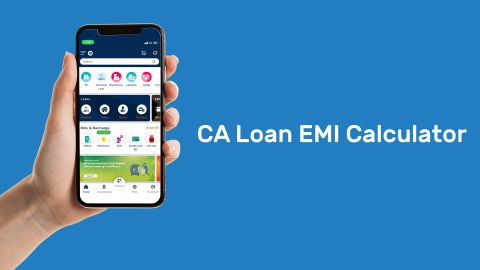Every chartered accountancy firm requires a timely infusion of funds for day-to-day operations and growth. Some of the most common needs of a CA firm are renting space in the heart of your city’s business district, hiring qualified employees and taxation experts, using the best accounting software and investing in short-term courses to be up-to-date with new regulations. Thus, finding an affordable and convenient source of finance becomes paramount.
Here are some options that you can use to finance your CA firm:
1. Take a Flexi business loan for CAs
- A Flexi business loan for chartered accountants is a customised offering that suits the various needs of a CA and helps them get a good interest rate due to the credibility of their profession and experience.
- You can use this loan for financing working capital, acquiring new premises, opening a branch office or buying a business asset. Its unique feature helps you meet unpredictable expenses easily.
- These loans are a smart way to finance your firm’s requirements as you save up to 45% on your regular EMIs and maintain a healthy cash flow. It is a collateral-free loan of up to Rs. 80 lakh with simple eligibility criteria and minimal documentation.
- Another benefit of a Flexi business loan for CAs is that you have complete control over your business and don’t have to share decision-making powers or profits with anyone else, which may not hold true for other forms of finance.
2. Swipe your credit card
- A credit card is a convenient way to finance your daily business expenses or instant payments. This option offers you excellent flexibility in paying various bills.
- A credit card can also be used with systems like MobiKwik and PayPal to make online payments. However, they are not suitable for big-ticket purchases. They could be an effective mode of finance for new firms, but for a growing practice, there could be many instances where cash payments would be necessary.
- Credit cardholders may also end up overspending, often not keeping track of their expenses. It is important to plan the repayment of your credit card bills.
- Unpaid credit card bills are subject to high interest rates and can stack up a huge debt. This affects your credit score negatively and may impede future loan applications.
Additional read: Why should you choose a loan for chartered accountants from Bajaj Finserv?
3. Attract an angel investor
- If your CA firm shows the potential for growth, you can attract individuals who will invest in your company in exchange for part ownership.
- An angel investor can offer you significant sums of finance, which you can use for various growth needs, be it setting up a new office or expanding operations to another location.
- However, these investors may want to have a say in how you run your CA firm and may not be the best option if you want complete control of your business.
- You are also liable to share a significant portion of the profits and are accountable to your investors for the performance of your business.
- It is important to also note that angel investors are more likely to provide funds at the seed stage. They may only invest until the business owner has also risked their funds.
4. Get a partner
- CA firms often start as partnerships to share the risk and responsibility of running a firm.
- You can convert your firm into a partnership by asking a qualified friend or colleague to invest some money and become a partner.
- It is important to choose your partner carefully as you will share profits and make business decisions together.
5. Involve your friends and family
- Borrowing from family and friends can be convenient, but draw up a clear repayment agreement.
- The downside of this source of finance is that it may result in biased decision-making and strained or broken personal relationships if your business does not register continual profits.
Chartered accountants can also use a combination of these options, rather than choose any one, to fund their practice. The right funding mix for your practice depends on factors like your financial requirements, the size or the growth stage of your practice, your risk appetite, your preference on the repayment plan and retention of ownership or stake. Once you have clarity on these, determining the right mix of finance for your practice becomes easy.
*Terms and conditions apply
DISCLAIMER:
While care is taken to update the information, products, and services included in or available on our website and related platforms/websites, there may be inadvertent inaccuracies or typographical errors or delays in updating the information. The material contained in this site, and on associated web pages, is for reference and general information purpose and the details mentioned in the respective product/service document shall prevail in case of any inconsistency. Subscribers and users should seek professional advice before acting on the basis of the information contained herein. Please take an informed decision with respect to any product or service after going through the relevant product/service document and applicable terms and conditions. In case any inconsistencies observed, please click on reach us.
*Terms and conditions apply








